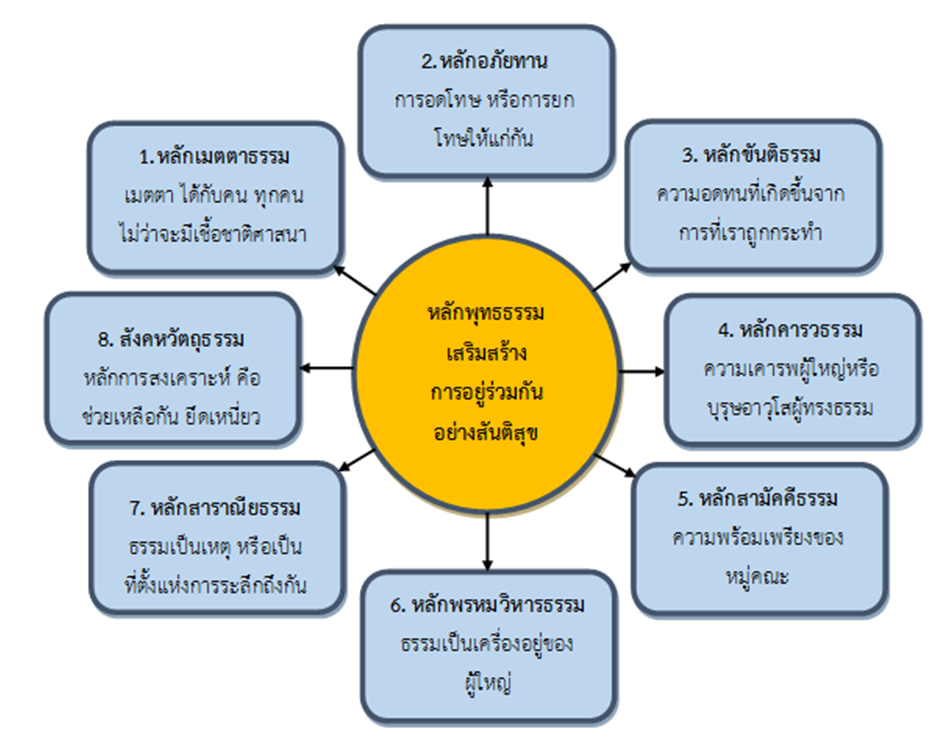PRINCIPLES OF PEACEFUL COEXISTENCE IN THAI SOCIETY ACCORDING TO BUDDHIST PRINCIPLES
Main Article Content
Abstract
This academic article It is intended to present Principles of peaceful coexistence in Thai society according to Buddhist principles Every human being is born with a duty to perform. But there is one important principle that allows humans to perform their duties and live together in a peaceful society. The principle is Buddhism, which is the principle of behavior. The right-wrong, should-not criterion that humans express themselves according to their beliefs, which are social norms and principles of uniting human beings in each society, will have the effect of making peace in society. Therefore, this article presents Buddhism, a principle in Buddhism. It is the principle of behavior and human practice that will bring about happiness. Peace in society This happiness is for the benefit of yourself. For the benefit of others or things that do to others and for the benefit of Thai society His doctrine thus creates love and unity with one another, and those who obey the teachings, whether they are monks or lay people who perform their duties in society, need to bring peace and participation. In the creation and promotion of world civilization as well And peace, which is a good thing or called Buddhism. Therefore, Buddhism is Take heart as the most important Considering the heart is great, the heart is the president, everything is accomplished by heart. It was the source of both violence and peace.
Article Details

This work is licensed under a Creative Commons Attribution-NonCommercial-NoDerivatives 4.0 International License.
References
กรมการศาสนา. (2537). พุทธศาสนสุภาษิต เล่ม 1. กรุงเทพมหานคร : โรงพิมพ์การศาสนา.
ประเวศวะสี. (2544). เศรษฐกิจพอเพียงบนรากฐานวัฒนธรรมชาวพุทธ. กรุงเทพมหานคร : สำนักพิมพ์ภัคธรรศ.
พระครูวิรัตธรรมโชติ และสำเริง แก้วเรืองฤทธิ์. (2557). การมีส่วนร่วมเหตุการณ์ปัจจุบันในการเมืองไทยของนิสิตมหาวิทยาลัยมหาจุฬาลงกรณราชวิทยาลัยวิทยาเขตนครศรีธรรมราช. นครศรีธรรมราช : มหาวิทยาลัยมหาจุฬาลงกรณราชวิทยาลัย วิทยาเขตนครศรีธรรมราช.
พระเทพดิลก (ระแบบ ฐิตญาโณ). (2557). ศาสนากับสันติภาพ. กรุงเทพมหานคร : บริษัท แปดสิบเจ็ด 2545 จำกัด.
พระมหาบุญเรียน ปภงฺกโร(พิลาพันธ์). (2542). การศึกษาวิเคราะห์แนวคิดเรื่องเมตตาในพุทธปรัชญาเถรวาท. วิทยานิพนธ์พุทธศาสตรมหาบัณฑิต สาขาวิชาปรัชญา. บัณฑิตวิทยาลัย : มหาวิทยาลัย มหาจุฬาลงกรณราชวิทยาลัย.
พระมหาปรีดา ขนฺติโสภโณ. (2559). พุทธธรรม : พลังขับเคลื่อนสู่สังคมสันติสุข. ผู้อำนวยการสำนักวิชาการวิทยาเขตนครศรีธรรมราช. สารนิพนธ์พุทธศาสตรบัณฑิต. บัณฑิตวิทยาลัย : มหาวิทยาลัยมหาจุฬาลงกรณราชวิทยาลัย.
พระมหาหรรษา ธมฺมหาโส (นิธิบุญยากร). (2547). รูปแบบการจัดการความขัดแย้งโดยพุทธสันติวิธี: ศึกษาวิเคราะห์กรณี ลุ่มน้ำแม่ตาช้าง จ.เชียงใหม่. วิทยานิพนธ์พุทธศาสตรดุษฎีบัณฑิต สาขาวิชาพระพุทธศาสนา. บัณฑิตวิทยาลัย : มหาวิทยาลัยมหาจุฬาลงกรณราชวิทยาลัย.
อานันท์ ปันยารชุน. (2541). คนดีที่สังคมยังต้องการ. พิมพ์ครั้งที่ 3. กรุงเทพมหานคร : แสงดาวการพิมพ์.


